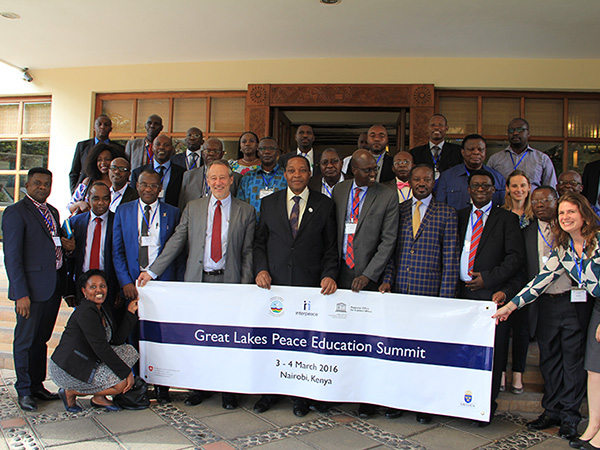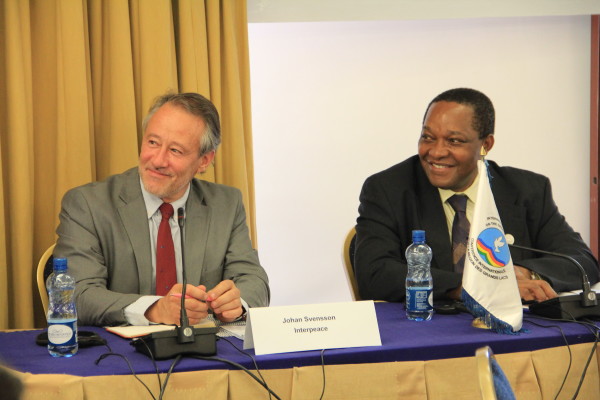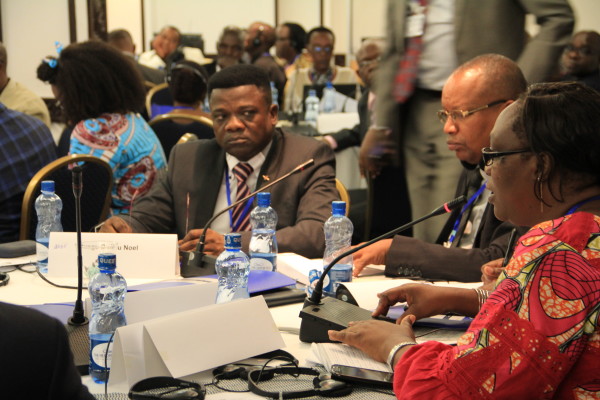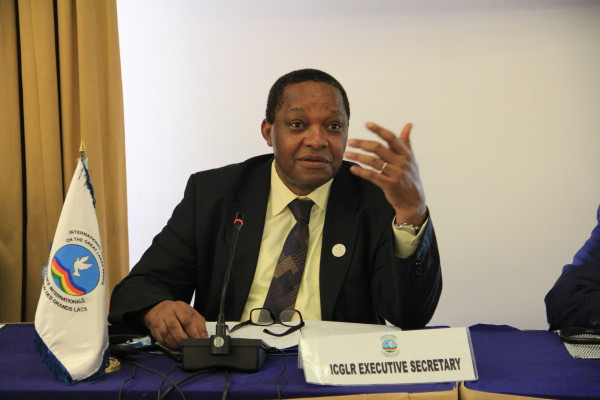Regional summit on formal peace education in the African Great Lakes held in Nairobi

On March 3-4, 2016, the International Conference on the Great Lakes Region (ICGLR), Interpeace and UNESCO successfully organized a regional summit on Peace Education in the African Great Lakes Region in Nairobi, Kenya.
Delegates at the two-day summit included officials from government ministries responsible for education, gender and youth; parliamentarians; leaders of provincial governments; education practitioners from Burundi, the Democratic Republic of Congo (DRC), Rwanda and Uganda; as well as technical experts in peacebuilding and peace education from Interpeace and UNESCO.
The summit was officially opened by Ambassador Josephine Gaita, ICGLR National Coordinator for Kenya. Its focus over the subsequent two days was on the implementation of formal peace education in the three ICGLR member states of Burundi, the DRC and Rwanda. The Republic of Uganda was also present as an active observer, while South Sudan was represented by its ICGLR National Coordinator.
The summit was premised on two prior occasions. The first was an Extraordinary Summit of ICGLR Heads of State and Government on Youth Unemployment, held on 24 July 2014 in Nairobi, which emphasized the important role of the youth in the pursuit of peace, security and stability within the region. The second was a 2014 participatory action research carried out by Interpeace and its six partner organisations in Rwanda, Burundi and the eastern DRC. The research was based on consultations with diverse actors across the Great Lakes region and revealed that most people considered identity-based stereotypes and manipulations as a fundamental obstacle to sustainable peace in the region. The research participants suggested that peace education could serve as a priority intervention to address challenges related to identity-based stereotypes and manipulation, arguing that peace education could both strengthen existing peacebuilding efforts and help in the prevention of conflict among future generations.
Proceedings included presentations on the current state of peace education in Burundi, the DRC, Rwanda and Uganda; expert presentations on the policy and practice of peace education; plenary discussions; and breakout sessions where country delegations had the opportunity to retreat and come up with their country-specific ideas on the way forward for the effective implementation of formal peace education. Participants expressed the need for regional level peace education strategies to respond to the intermittent conflicts in the Great Lakes region, which often have a cross-border dimension.
It emerged from the discussions that peace education efforts already existed in all the three countries, albeit at varying levels of implementation. Among the challenges identified were the need to develop comprehensive peace education frameworks, as well as a pedagogy that would facilitate a harmonized understanding of formal peace education in all the three countries. Country delegations committed themselves to sharing the findings of the summit with the concerned actors in their respective countries, in order to make sure that the summit results will inform future discourse on peace education.

Interpeace Regional Director for Eastern and Central Africa, Johan Svensson (left) and ICGLR Executive Secretary Ntuba Luaba at the summit. Photo credit: Interpeace
Interpeace’s Regional Director for Eastern and Central Africa (ECA), Johan Svensson, praised the national delegations and the ICGLR for taking into account the sentiments of the local populations in their efforts to integrate formal peace education both domestically and across the region.
“Your commitment as stakeholders is inspiring because you are responding directly to your people’s call for peace education,” Mr Svensson remarked at the summit.
These findings were emphasized by ICGLR Executive Secretary, Professor Ntumba Luaba, who called for the creation of a regional ICGLR peace education programme and praised the delegates for taking the initial steps towards the harmonization of formal peace education for sustainable peace in the future.
“Peace education has the potential to create a new generation of women, men and youth who will be the guardians of peace in the region,” Professor Ntumba told participants at the summit.
Professor Luaba also lauded ICGLR’s partnership with Interpeace, which made it possible for the summit to take place. He also suggested the joint organisation of a similar Peace Education summit with the participation of all the twelve ICGLR Member States. The ICGLR’s twelve member states are Angola, Burundi, the Central African Republic, the Republic of Congo, the DRC, Kenya, Rwanda, Sudan, South Sudan, Tanzania, Uganda and Zambia.
More information
Read about Interpeace’s ‘Cross-Border Dialogue for Peace in the Great Lakes programme’
Read an opinion piece by ICGLR Executive Secretary Ntumba Luaba on youth and peace education in the African Great Lakes region


